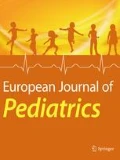Abstract
Fifty spontaneously breathing, preterm infants 48h old, of 32 weeks' gestation or less, were assigned randomly to receive caffeine citrate (loading dose 20 mg/kg, maintenance dose 10 mg/kg per day) or a placebo (NaCl 0.9%). The study hypothesis was that caffeine reduces the proportion of infants with recurrent hypoxaemic episodes (decrease in transcutaneous PO2 of 20% within 20ss) from 50% to 25%. Transcutaneous oxygen tension (tcPO2) and heart rate were recorded continuously for 50h and analysed by computer. The two groups were similar in gestational age, birth weight, delivery mode, sex distribution, and Apgar scores. The mean serum concentration (±SD) of caffeine 2h after the second maintenance dose was 96.0 (±34.5) μmol/l in the group receiving caffeine and 9.3 (±12.8) μmol/l in the group receiving a placebo. The mean proportion of infants with more than six hypoxaemic episodes per 12h in the caffeine groups was higher (57%) than in the control group (51%). The mean proportion of infants with more than six episodes of bradycardia per 12h was not statistically different in the caffeine group (79%) from the control group (86%). Our results suggest that prophylactic caffeine has little if any effect on the risk of developing hypoxaemic episodes and bradycardia in small preterm infants and the supposed 50% reduction which was considered clinically important at the start of the trial can be rejected with confidence.
Similar content being viewed by others
Abbreviations
- tePO2 :
-
transcutaneous oxygen tension
References
Aranda JV, Gorman W, Bergsteinsson H, Gunn T (1977) Efficacy of caffeine in treatment of apnea in the low-birth-weight infant. J Pediatr 90:467–472
Bucher HU, Fallenstein F, Mieth D, Duc G (1985) Efficacy of low and high dose caffeine on idiopathic bradycardia and hypoxemia in premature infants. Helv Paediatr Acta 40:153–162
Bulpitt CJ (1983) Randomised controlled clinical trials. Martinus Nijhoff, The Hague
Clark CJ, Downie CC (1966) A method for the rapid determination of the number of patients to include in a controlled clinical trial. Lancet II:1357–1358
Detsky AS, Sackett DL (1985) When was a “negative” clinical trial big enough? Arch Intern Med 145:709–712
Gore SM (1981) Statistics in question. Assessing methods-confidence intervals. Br Med J 283:660–662
Hrbek A, Karlberg P, Kjellmar I, Olsson T, Riha M (1978) Clinical application of evoked EEG-responses in newborn infants. II. Idiopathic respiratory distress syndrome. Dev Med Child Neurol 20:619–626
Hurt CE, Brouillette RT, Liu K, Klemka L (1985) Day-to-day pneumogram variability. Pediatr Res 19:174–177
Koppe JG, de Bruijne JI, de Boer P (1979) Apneic spells and transcutaneous Po2: treatment with caffeine, 19 year follow-up. Birth Defects 15:437–445
McDonald A (1963) Cerebral palsy in children of very low birth weight. Arch Dis Child 38:579–588
Murat I, Moriette G, Blin D, Couchard M, Flouvat B, De Gamarra E, Relier JP, Dreyfus-Brisac C (1981) The efficacy of caffeine in the treatment of recurrent idiopathic apnea in premature infants. J Pediatr 99:984–989
Peabody JL, Gregory GA, Willis MM, Philip AGS, Lucey JF (1979) Failure of conventional monitoring to detect apnea resulting in hypoxemia. Birth Defects 15:275–284
Saint-Martin J, Duhamel S, Choulot JJ (1980) Utilisation de la caféine dans les apnées du prématuré. Pédiatrie 35:21–27
Silverman WA (1985) Human experimentation. A guided step to the unknown. University Press, Oxford, pp 112–126
Southall DP, Levitt GA, Richards JM, Jones RAK, Kong C, Farndon PA, Alexander JR, Wilson AJ (1983) Undetected episodes of prolonged apnea and severe bradycardia in preterm infants. Pediatrics 72:541–551
Tönz O, Schubiger G (1985) Feeding of very-low-birth-weight infants with breast milk enriched by energy, nitrogen and minerals: FM85. Helv Paediatr Acta 40:235–247
Trounce JQ, Levene MI (1985) Diagnosis and outcome of subcortical cystic leucomalacia. Arch Dis Child 60:1041–1044
Author information
Authors and Affiliations
Rights and permissions
About this article
Cite this article
Bucher, H.U., Duc, G. Does caffeine prevent hypoxaemic episodes in premature infants?. Eur J Pediatr 147, 288–291 (1988). https://doi.org/10.1007/BF00442697
Received:
Accepted:
Issue Date:
DOI: https://doi.org/10.1007/BF00442697




